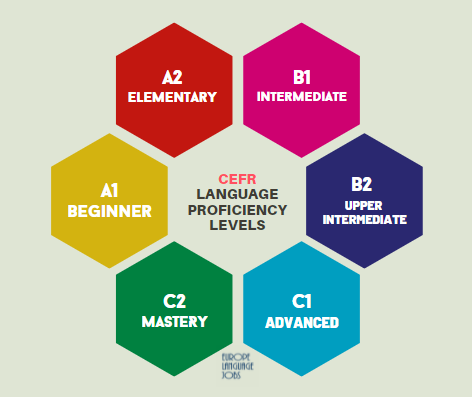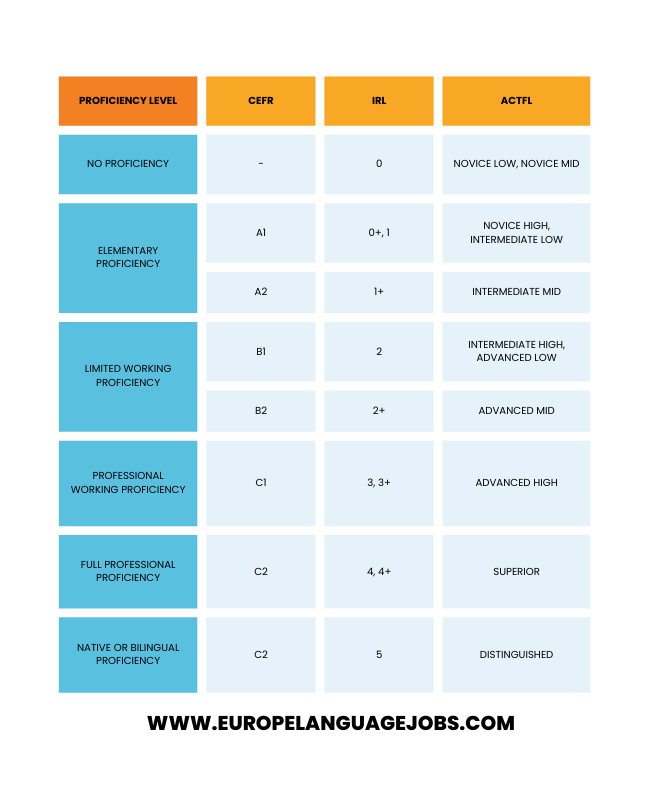Are you in the process of updating your resume? Or perhaps it is your first resume, and you are actually still a student in college? If the latter is true, you definitely need help creating your first CV.
Most likely, you also need a cheap essay service online to help you with your assignments and free up more time for work. But what is really important in both cases is to know how to highlight your strong skills in your resume.
Including language proficiency is a must when making a resume skills list. Job candidates with language proficiency in their CV have a significant advantage over monolingual candidates in many different professional roles and sectors.
Although having high language levels is great, you also have to know how to present your strengths in a truthful and powerful way.
In this article, you will find what it means to be proficient in a language from the perspective of a job recruiter and how to make sure that your language skills resume is impeccable.
Read on to discover some strong tips on how to write about your levels of language proficiency in your resume. But before we begin, I'd like to share the EasyEssay service that will help anyone with paper writing.
Overview
Listing language skills in a CV can give you a competitive edge when applying for jobs. There are specific frameworks you should use to describe your fluency level, and official certifications which confirm your knowledge of a language on a particular level. You can add language skills to your resume in several different sections, depending on their importance for the job you're applying to. Which languages look good on your CV depends on your country and industry, but some languages are more in demand than others.
- How to List Languages on Resume?
- Why Is It Important to Add Language Skills in CV?
- What Languages Look Good on a Resume?
- Understanding Levels of Language Proficiency in Resume
- Where to Add Languages to Your Resume?
- What are the Different Levels of Language Proficiency in Resume?
- Add Evidence of Your Levels of Proficiency
- Key Tips to Remember About Language Skills in CV
- Language Skills on Resume: Examples
How to List Languages on Resume?
Writing a compelling resume that can emphasize and highlight all your skills, abilities, experience, and achievements is not easy. Many people prefer to use professional resume writing services like CraftResumes.com.
This is because it takes an expert writer to know exactly how to put the right word in the right place with great attention to detail. Although adding CV language skills might seem simple, it takes a bit of consideration in advance if you want to do it right.
Why is it Important to Add Language Skills in CV?
As a job seeker, you want to inform potential employers about your language skills for several important reasons:
- Your language skills are needed for the job
- You want to make yourself a more desirable candidate
- You want to show that you’re a quick learner
- Your knowledge can be an asset to the company’s future growth
When you add a language skill level to a CV, its relevancy must be evident to the recruiter. Your goal is to show that you can add value to the company as a future bilingual or multilingual employee.
According to Charles Vallena, CEO for Cuppabean:
Language skills are good to have on a resume because they show you hold the ability to communicate more effectively in contexts when other people would find obstacles.
In business terms, this means better contacts and relations and thus better opportunities in a globalized world.
What languages look good on a resume?
The most accurate answer to this question is: it depends. Different languages can be in demand in various countries and industries. However, there are some languages that employers look for more than others. They include:
- German
- Dutch
- French
- Nordic languages (Danish, Swedish, Norwegian, Finnish)
Read about the most useful European languages and discover where your native language is in demand for more detailed advice.
Understanding Levels of Language Proficiency Resume
Being able to carry on a conversation with a French waiter in Paris is wildly different from having professional working proficiency in French. To be able to add your language skills to your resume, you must judge your abilities with full honesty regarding speaking, writing, and reading.
First, make a list of languages you know. Depending on the type of job you seek, your future employer might be more interested in your writing skills so you can maintain communication with foreign business partners.
Another employer might be interested in your speaking skills because they want you to participate in a meeting with foreign partners. Languages are a very broad topic, so you should identify your strong points and think about how you can transform them into your strengths.
Before adding your language proficiency levels to CV, ensure that you understand:
Where to Add Languages to Your Resume?
Languages are one of the most important elements on a list of resume skills. With this in mind, you must decide in which section you should add your linguistic knowledge. Depending on the type of job you seek, you can include them in the general skills section or create a new section titled Languages.
The section can be added:
- On the top of your resume. If language skills are important for the position you're applying to, or it can majorly benefit your employer, add the section right after the resume summary.
- After the Work Experience section. If your language level is not essential for the job, but more like a bonus skill, add it to the lower section on your resume.
- In the Education section. If language skills are not relevant for the position, mention your proficiency levels in the Education section.
What are the Different Levels of Language Proficiency in Resume?
Now we’ve reached the most important aspect of language skills resume writing. It refers to how to describe your level of language proficiency so that a future employer can understand how well you write, read, or speak.
Would you be able to use it effectively in a professional context? How to indicate your exact language skills? All CVwriting services use official assessment frameworks.
If you’re uncertain about your abilities, you can take a certification test in which you’ll assess your current knowledge. You will also receive official proof of your language competencies.
1. CEFR (Common European Framework of Reference for Languages)
The CEFR framework was developed by UNESCO and is primarily used in Europe. It divides language proficiency into six levels:
- Intermediate (B1) and Upper-intermediate (B2). You can carry out basic conversations in a wide variety of situations, but you still make grammar mistakes. You have limited working proficiency.
- Advanced (C1). You are skilled enough to carry complex conversations but still put in the conscious effort when speaking and writing.
- Proficient/Fluent (C2). This means full of professional working proficiency. You have fluid speech and master reading and writing, but with a less advanced vocabulary than a native. The proficient vs fluent is a matter of grammar and colloquialisms.
- Native or bilingual. Full mastery of the language through either upbringing or advanced education.

Importantly, the first three basic indicators on the language proficiency scale, Beginner (A1), Elementary (A2), and Pre-intermediate (A2/B1), refer to elementary proficiency and should not be included in the resume. They are too limited for a professional context. An employer would consider them irrelevant.
As the CEFR framework is the most commonly used one in Europe, we recommend choosing this one when including language levels in your CV when applying for jobs at Europe Language Jobs.
2. ILR (International Language Testing System)
The IRL scale is a universal framework commonly used by companies all over the world. It tests your language skills in four areas: reading, writing, speaking, and listening. Each area is marked from 0 to 5 - 0 stands for no fluency, and 5 for a native or near-native language level. The in-between levels are also marked by a +.
3. ACTFL (American Council on the Teaching of Foreign Languages)
The ACTFL framework is mainly popular in America, so we don't recommend using it when writing a CV in different European countries. Another limitation is that it is typically used in an academic setting, so it may not be suitable for language speakers describing their language level in a professional setting.
In contrast to the other two frameworks, this one doesn't use letters and/or numbers in its classification. ACTFL divides language proficiency into 6 descriptive levels, from ACTFL Novice Low to ACTFL Advanced High Plus.
Language level framework comparison

Add Evidence for Your Levels of Proficiency
Let’s say that you’ve looked at the proficiency scale and decided that you’re proficient in Spanish. To convince a future employer of your language proficiency level in Spanish, you can mention in your resume the professional contexts where you used it.
To show proof of your abilities in the language levels CV, add activities where speaking, writing, or reading the language were essential in ensuring success. Some examples include:
- Volunteering projects abroad
- Internships abroad
- Student exchange programs
- School immersion programs
- Translation and interpreting projects
- Summer jobs in tourism, hospitality, or retail where you interacted with foreign customers.
Don’t forget to include how long you studied all the languages on your resume and whether you studied them in an academic context. Indicate if you’re self-taught and what certifications you hold.
While self-assessment is not necessarily a problem, many employers prefer to see an external confirmation of your language skillsand fluency levels. This means official certifications.
However, you should remember that your CV doesn't have a lot of space on it. When you want to include an explanation for your past experiences or for the listed languages, you should be brief about it. Summarize the main points so that they all fit in easily.
Key Tips to Remember About Language Skills CV
When you add language proficiency levels to your resume, you need to take into account the type of job you’re applying to, the profile of the company, and the types of interactions you might have at work. Language skills can have a great positive impact on your career if you can emphasize how they can be useful to your future employer.
- To describe your language proficiency levels in your resume, use official assessment tools and frameworks for adding languages to a resume.
- Don’t overestimate your language proficiency levels. If your employer discovers this, your reputation as a professional will get sabotaged.
- Remain consistent with levels of proficiency resume wording in the section.
- If your employer is a Spanish company, you can write your resume in Spanish to fully demonstrate your proficiency level.
- If you have intermediate proficiency but the job requires native or bilingual proficiency, invest in a fast language training course.
Are you in the process of updating your resume? Make sure to include your language skills, as they are a must when making a resume skills list. Job applicants with language proficiency in their curriculum vitae are a step ahead of other candidates in many different industries.
Language Skills in Resume: Examples
If you're still not sure, here are examples of writing your language skills in a CV using different frameworks:
CEFR
- English: C2 (Native)
- French: C2 (Bilingual)
- German: B2 (Limited working proficiency)
IRL
- English: 5
- French: 4+
- German: 3+
ACTFL
- English: Distinguished
- French: Superior
- German: Advanced mid
Although having high language levels is impressive, you also have to know how to showcase your strengths in a truthful and powerful way.
Many candidates attempt to include as many advantages as possible. As a result, they look through some less relevant materials such as how to summarize an article without plagiarizing it.
Jennifer Broflowski is a freelance writer with more than a decade of experience. With a fervent interest in career growth and self-improvement, she writes about topics she loves for reputable worldwide publications. She lives in Sydney, Australia.














Anonymous user1y ago
Writing language skills on your resume/CV effectively is essential for showcasing your communication abilities. A superb paper https://superbessay.com/ can help you research the best strategies, like categorizing skills by proficiency levels (basic, intermediate, advanced) or using standardized terms (e.g., CEFR levels). Highlighting relevant certifications or practical applications of these skills ensures your resume stands out to recruiters.
Writing language skills on your resume/CV effectively is essential for showcasing your communication abilities. A superb paper https://superbessay.com/ can help you research the best strategies, like categorizing skills by proficiency levels (basic, intermediate, advanced) or using standardized terms (e.g., CEFR levels). Highlighting relevant certifications or practical applications of these skills ensures your resume stands out to recruiters.